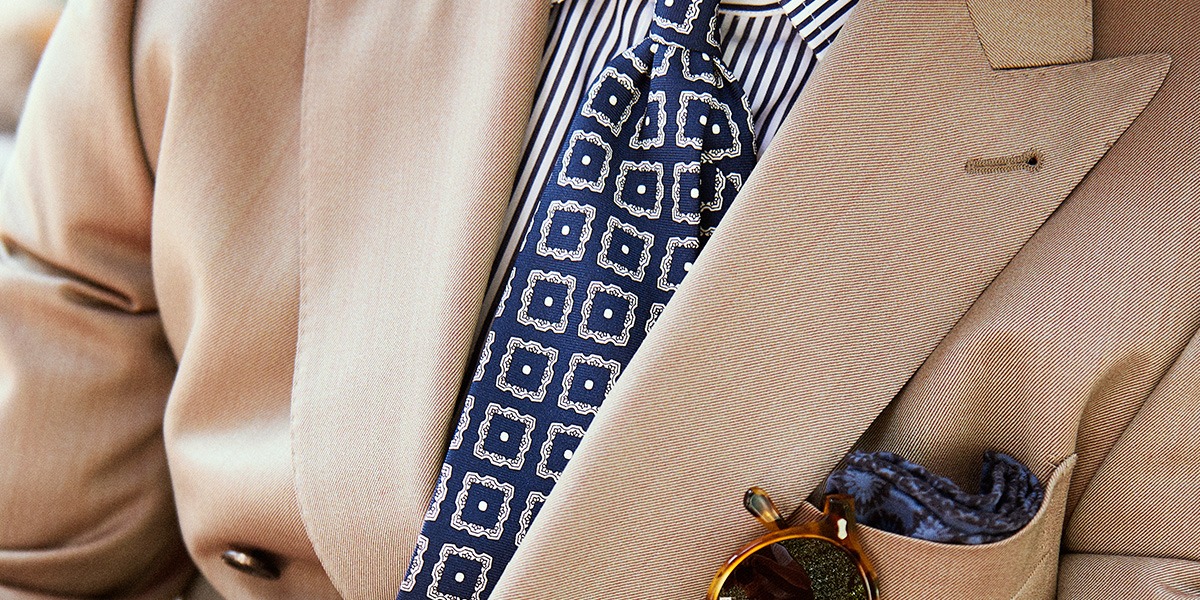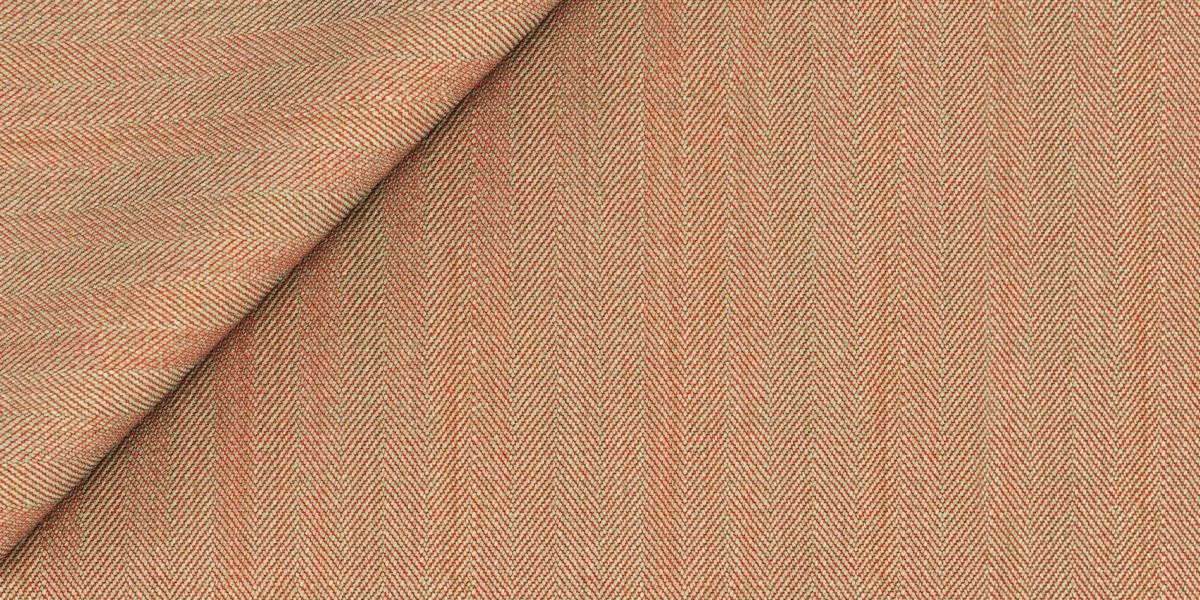The Solaro suit was worn by men from all over the world, becoming the official summer uniform of elegant contemporary gentlemen like Gianni Agnelli, Luca Cordero di Montezemolo, Lapo Elkann, Fabio Attanasio and Matteo Marzotto.
Find out more about this men’s fashion myth, now a days worn almost exclusively in the suit version, and learn how to wear it for a summer look full of charm.
Menu
How a Solaro fabric is made
Only a few fabrics are have such an recognizable image. The diversity of the warp and the weft creates an evident iridescent effect which, captures the reflections of light and reflect back different shades of light.
Considering its whimsical appearance, it is a perfect fabric for the mid-seasons and in particular for the hot summer days. A medium weight wool fabric, whose structure is usually available in the diagonal version (classic gabardine) and the wide or narrow herringbone.
As for the color, one of them is an iconic one: on the front greenish beige color with slightly iridescent shades of red and brick red on the reverse.
History of the solaro fabric
How the Solaro fabric was born
The Solaro fabric was the first technical fabric created by man, it was aimed to protect British soldiers from the harmful effects of ultraviolet rays during the conquests of the Imperial Century, between the 19th and 20th centuries.
The UV rays were thought to be the cause of physiological dysfunctions and nervous disorders in the soldiers. The troops used the red side of the fabric to line the helmets and the beige side to make uniforms that could protect them from the harmful rays.
Louis Westenra Sambon, the inventor of this fabric, was an important English tropical doctor with Italian origins. He began working on the Solaro after having supported some experiments in spectroscopy, in which he had noted that “by examining the skin of the color races we found evidence of strong absorption by the pigment contained therein”.
The experiments confirmed “the theory that pigmentation provides an effective natural protection against ultraviolet rays present in sunlight, particularly in tropical regions”.
The Solaro fabric was perhaps the first technical fabric created by man and was created in the early twentieth century, in the peak of the colonial period.
The great powers (such as England, France, Spain, Portugal, the United States and Belgium) from the beginning of the century began to face the need to move troops to countries characterized by a decidedly different climate than their origin.
The Solaro – as the name suggests – was specially created to prevent not only sunburn, but it was aimed to protect British soldiers from the harmful effects of ultraviolet rays because the UV rays were thought to be the cause of physiological dysfunctions and nervous disorders.
Louis Westenra Sambon, the inventor of this fabric, was an important English tropical doctor with Italian origins. He began working on the Solaro after having supported some experiments in spectroscopy, in which he had noted that “by examining the skin of the color races we found evidence of strong absorption by the pigment contained therein”.
The experiments confirmed “the theory that pigmentation provides an effective natural protection against ultraviolet rays present in sunlight, particularly in tropical regions”.
The choice of material directed towards wool, based on the assumption that the real wool, which nature has created to cover the body of some animals, would be the most suitable clothing material to achieve the survival of people.
British soldiers in the tropical places used the red side to fabric for the lining of their helmets and the beige side to make uniforms that could protect them from the sun’s rays.
However, at the beginning of the twentieth-century developments in parasitology and health sciences disgraced the idea that the climate played a direct role in the inception of the tropical diseases.
In addition, James M. Phelan, an American doctor, conducted experiments in the Philippines on five hundred US soldiers wearing Solaro clothing, demonstrating that the fabric actually had no efficacy in protecting the people who wore it, in fact: the clothes were so uncomfortable to be almost harmful to troop health.
From that moment on the Solaro definitively became free from its “medical” role to become simply an essential style icon for the summer.
Who has marketed it and patented it?
Subsequently, the Solaro was patented by the English company Smith Woollens who holds the rights to use it as a patented product and sell it as “Original Solaro made in England”.
Currently, no manufacturer can use the name Solaro for their garments, although it is still possible to produce identical fabrics with the same characteristics and the same quality.
For example, in the men’s clothing collection by Lanieri, there are several suits, called Riviera, which take inspiration from the classic Solaro fabric and suits, and they are identical in appearance and texture.
When to wear a solaro suit

Considering the particular chromatic characteristics, it is a garment to show off only during the during the months from May to September: therefore spring and summer are the ideal time to wear it to the fullest. The seasonal features of the suit are also reflected in the choice of fabrics used for making it: cotton and light wool.
Although it expresses the right balance between informality, contempt and elegance, it is not recommended to use the suit for very formal occasions, important evenings, ceremonies or occasions that require a challenging dress code. On the other hand, during the spare time – such as at a cocktail party – let your imaginations run wild.
How to wear a Solaro suit
The most important thing to know about the Solaro is that it should not be worn “separated (broken suit)”. This type of fabric, in fact, is only suitable for making the entire suit, single, double-breasted or semi-lined.
The Solaro suit is a solid color garment that does not have a wide choice in design, however, it is not easy to find the right combination when it comes time to match men’s shirts, ties and pocket squares. Considering its whimsical nature, a first suggestion is to balance the tones of the look, going for discreet colors and accessories.
Shirt
For a formal and a rather classic ensemble you can opt for the suit with double-breasted jacket, wear it with a white shirt in poplin with an Italian collar. If you prefer a less traditional style, combine the single-breasted suit with a simple blue oxford shirt with a French or semi-French collar.
Looking for a more informal look? Indulge yourself in a two-button jacket suit and sometimes pair it with a blue striped shirt with a semi-French collar, and the other times with a denim shirt with a button-down collar.
Necktie
The tie is not mandatory, but you can choose a tie in silk or wool in shades of beige, pink or green if you want a more formal and refined look.
Shoes
Given the good weather, you can wear your suit with some chic tassel or Belgian loafers, obviously in brown. Alternatively, if you want to add a touch of extra composure to your look, you can wear it with simple brown lace-up shoes, like semi-brogues.
Belt
Mandatory if you have chosen to configure your pants with belt loops, but a belt is useless if you have opted for more essential type of trousers, perhaps provided with side buckles. Match your belt with the color of the shoes.
Hat
Do you want to wear your Solaro suit with a hat? Here are two elegant options, and they never go out of fashion. A versatile straw hat, robust but flexible, like the Borsalino, fits perfectly to the nape and adapts to the shape of anyone’s face. Another option is the Panama hat: a taut straw hat of Ecuadorian origin. A real must-have among the collection summer hats.
Unique, for everyone
The Solaro suit is definitely an unconventional garment, but not very extravagant; in fact, the iridescent effect mentioned is just enough to remind the world that you have enough self-confidence to wear a suit that goes beyond mundane.
The other positive note, which makes it a real must-have is that it fits everyone. Just take a look at the online gallery, and you’ll see that a Solaro suit looks perfect on every single person. In short, there seem to be no more reasons not to immediately create your own custom Solaro suit.



Is Lanieri bringing this fabric back??!!
Hello Daniel, you can find it here https://www.lanieri.com/en/suits/fabrics/riviera-macro-herringbone-3717